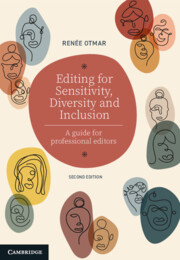Book contents
- Editing for Sensitivity, Diversity and Inclusion
- Acknowledgement of Country
- Editing for Sensitivity, Diversity and Inclusion
- Copyright page
- Dedication
- Contents
- About the author
- Preface
- Acknowledgements
- Part One Foundations
- Part Two Professional practice
- Chapter 5 Identifying the explanatory framework within a text
- Chapter 6 Literary worth versus literary intention
- Chapter 7 Plagiarism
- Chapter 8 Literary appropriation
- Chapter 9 Cultural appropriation
- Chapter 10 Decolonisation
- Chapter 11 Legal reading
- Chapter 12 The main types of critical appraisal
- Chapter 13 Editing for sensitivity, diversity and inclusion
- Chapter 14 Moral and ethical dimensions of editing
- Chapter 15 Developing a workplace policy and style guide
- Chapter 16 Principles for a professional practice
- Chapter 17 Care of the self
- Conclusion
- Part Three Guide
- Index
Chapter 8 - Literary appropriation
from Part Two - Professional practice
Published online by Cambridge University Press: 24 August 2023
- Editing for Sensitivity, Diversity and Inclusion
- Acknowledgement of Country
- Editing for Sensitivity, Diversity and Inclusion
- Copyright page
- Dedication
- Contents
- About the author
- Preface
- Acknowledgements
- Part One Foundations
- Part Two Professional practice
- Chapter 5 Identifying the explanatory framework within a text
- Chapter 6 Literary worth versus literary intention
- Chapter 7 Plagiarism
- Chapter 8 Literary appropriation
- Chapter 9 Cultural appropriation
- Chapter 10 Decolonisation
- Chapter 11 Legal reading
- Chapter 12 The main types of critical appraisal
- Chapter 13 Editing for sensitivity, diversity and inclusion
- Chapter 14 Moral and ethical dimensions of editing
- Chapter 15 Developing a workplace policy and style guide
- Chapter 16 Principles for a professional practice
- Chapter 17 Care of the self
- Conclusion
- Part Three Guide
- Index
Summary
There are many definitions of what might constitute literary appropriation. On the side of generosity and openness is the idea of using a well-known literary work as inspiration for a reworking, or re-imagining, so as to offer a new or extended perspective or meaning. An intellectual or scholarly approach might be to explore intertextuality or commentary, whereby elements of one work are explicitly or implicitly referenced in another. A more critical interpretation might be that of a hostile takeover of minoritised languages and cultures in post-colonial societies. This section explores some interpretations of literary appropriation.
Keywords
- Type
- Chapter
- Information
- Editing for Sensitivity, Diversity and InclusionA Guide for Professional Editors, pp. 66 - 70Publisher: Cambridge University PressPrint publication year: 2023

